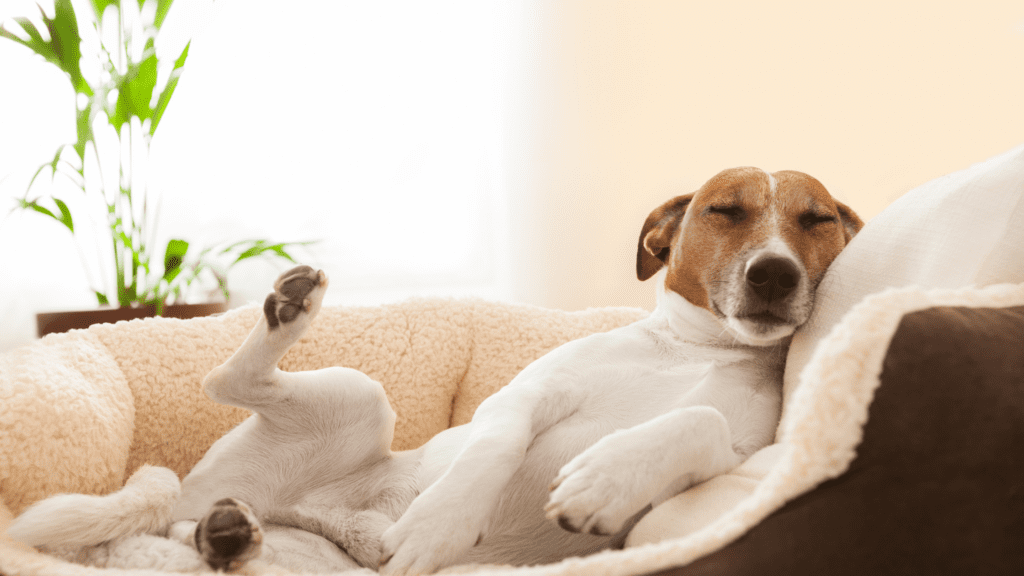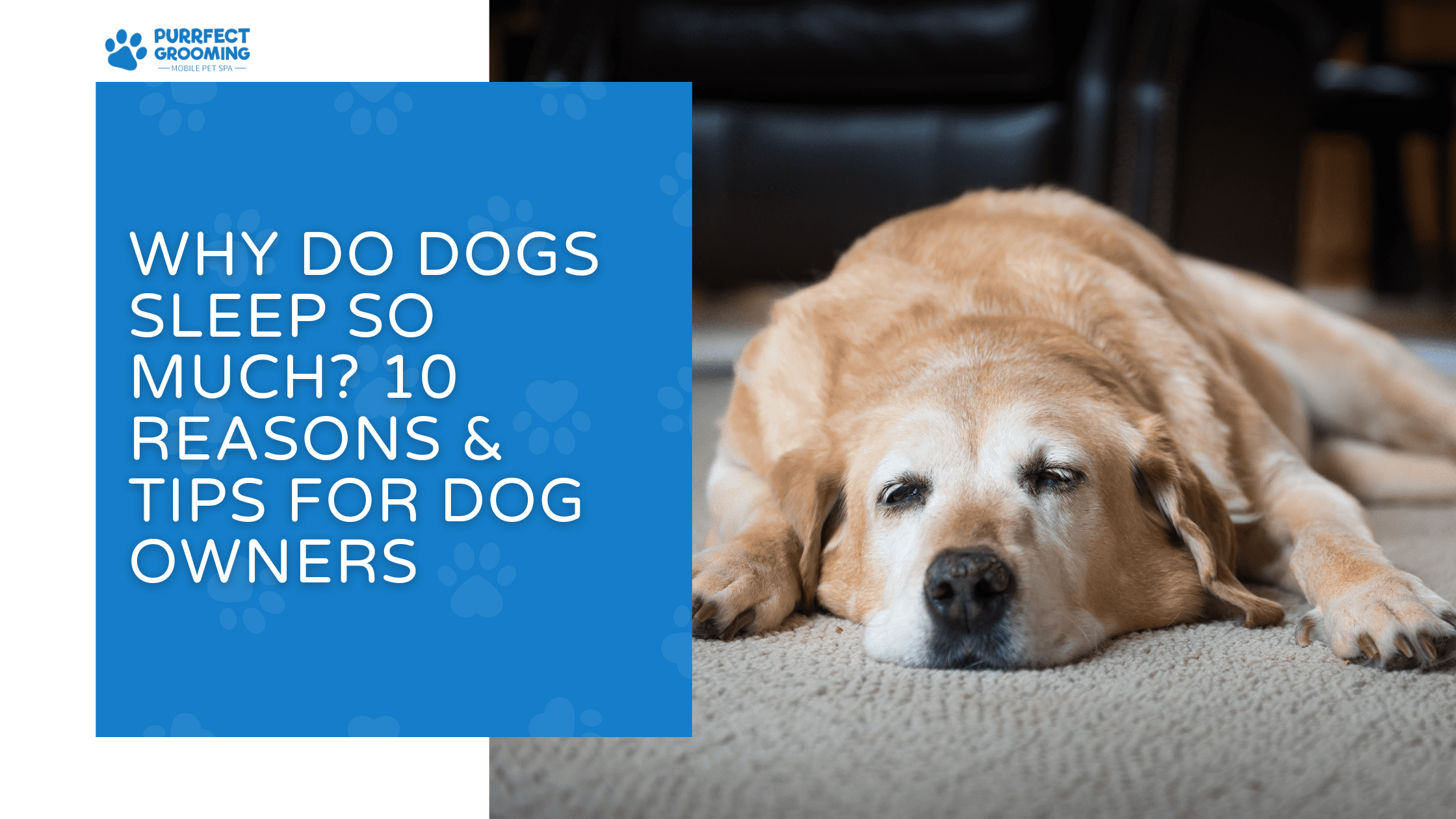Why Do Dogs Sleep So Much? 10 Reasons & Tips for Dog Owners
Have you ever caught yourself watching your dog snooze for hours and thought, why does my dog sleep so much? It’s a common question that many dog owners ask, and it’s completely understandable. Dogs seem to spend a significant portion of their day napping, and if you’re wondering, why is my dog sleeping so much, you’re not alone. The reality is, dogs sleep a lot more than humans, and this is not only normal but part of their natural biological rhythms.
In fact, adult dogs typically sleep for 12 to 14 hours a day, with puppies and senior dogs needing even more rest. According to the American Kennel Club , some dogs can even sleep up to 20 hours a day, especially if they’re still growing or have reached their senior years. So if you’re concerned about your dog’s sleep schedule, it’s important to understand that it’s largely dependent on their age, breed, and lifestyle. Let’s dive into some of the reasons why dogs sleep so much, and when you should start paying attention to a change in their patterns.
How Much Sleep Is Normal for Dogs?
One of the most important things to consider when evaluating your dog’s sleep habits is the amount of sleep that is considered normal for them. Sleep requirements vary based on several factors, including age, breed, and activity level. While dogs do tend to sleep a lot more than humans, not all sleep is equal. Some breeds and life stages naturally lead to longer sleep durations, while others may be more active and alert. Here’s a closer look at how much sleep your dog might need:
Puppies: Puppies need a lot of sleep, as their bodies are growing rapidly. They can sleep up to 18 to 20 hours a day, as their energy is spent on developing their muscles, brain, and immune system. So if you’re wondering, why does my puppy sleep so much?, the answer is simple—it’s just part of their development process.
Adult Dogs: Most adult dogs typically sleep for about 12 to 14 hours a day, with sleep occurring in short bursts throughout the day and night. Dogs are polyphasic sleepers, meaning they don’t have a single long stretch of sleep like humans. They often nap during the day, with periods of activity in between.
Senior Dogs: Older dogs tend to sleep more as they become less active. As dogs age, their metabolism slows down, and they experience changes in their physical and mental health that lead to increased sleep needs. Senior dogs can sleep anywhere from 14 to 18 hours a day.
Additionally, large breeds, especially those with shorter life expectancies like Great Danes, may sleep longer due to their slower metabolisms and larger body sizes.
Not all dogs have the same sleep needs. Here’s a simple breakdown:
| Dog Type | Average Daily Sleep |
| Puppies | 18-20 hours |
| Adult Dogs | 12-14 hours |
| Senior Dogs | 14-18 hours |
| Large Breeds | Up to 18 hours |
| Active Working Dogs | 10-12 hours |
Most adult dogs will snooze throughout the day, catching naps in between activity bursts.
Why Does My Dog Sleep So Much?
It’s completely normal for dogs to sleep a lot, but if you’re asking, why does my dog sleep so much specifically, it’s because dogs, just like humans, have natural biological rhythms that dictate their need for rest. Dogs are crepuscular, meaning they are most active during the dawn and dusk hours. This makes them naturally inclined to sleep more during the day, especially in the middle of the day when there’s less activity or excitement around them.
Dog sleeping vs. human sleeping habits are very different. While humans tend to sleep in one long stretch at night, dogs tend to take several naps throughout the day. Dogs also experience shorter sleep cycles that are more likely to include quick bursts of energy and activity, especially during dream phases (REM sleep).
One thing to remember is that sleeping for longer periods isn’t inherently bad for your dog. In fact, they need that sleep for mental and physical restoration.
Puppies and Sleep: Little Dogs, Big Naps
Puppies sleep more than adult dogs, often up to 20 hours a day. It may seem like they spend most of their time curled up in a corner or in your lap, but this sleep is crucial for their growth. During these lengthy naps, puppies are building strength and gaining energy for play and exploration. Their bodies are busy developing essential systems, including their muscles, nervous system, and immune response.
While they may seem like little energy bundles when awake, puppies need to sleep to recover from all the new experiences they encounter during their waking hours. It’s not uncommon for puppies to suddenly fall asleep after a few minutes of play, as their tiny bodies get worn out quickly.
If your puppy is sleeping a lot, don’t worry. This is a sign of healthy development, though you should make sure they are also getting enough exercise, playtime, and mental stimulation to balance their daily schedule.
| Age | Recommended Sleep |
| 2–4 weeks | 20–22 hours |
| 5–12 weeks | 18–20 hours |
| 3–6 months | 16–18 hours |
Senior Dogs: Sleep and Aging
As dogs get older, their energy dips, and they start snoozing more. Their joints ache, metabolism slows, and their senses dull—just like us. That’s why older dogs tend to sleep longer and may nap more frequently.
If you’re asking yourself, why is my dog sleeping so much lately?, and they’re older than 7–8 years, it’s usually just age catching up.
Dog Sleeping Patterns Explained
Dogs cycle through stages of sleep:
REM vs. Non-REM
- REM Sleep: Where dreams happen. Twitching, paw paddling—classic signs!
- Non-REM Sleep: Light rest, making up most of their sleep time.
| Sleep Stage | Time in Stage (%) |
| REM | 10–12% |
| Non-REM | 75%+ |
Dogs are polyphasic sleepers, which means they sleep in short bursts, usually lasting 45 minutes at a time.
Why Is My Dog Sleeping So Much Suddenly?
Sudden changes can be a red flag.
Possible Health Issues:
- Hypothyroidism
- Diabetes
- Depression
- Infections
- Heart Disease
If your dog’s sleep habits suddenly shift, contact your vet. Early diagnosis can make a huge difference.

Factors That Affect Dog Sleep
Several things can tweak how much your pup snoozes.
| Factor | Effect on Sleep |
| Diet | Poor diet = sluggish dog |
| Exercise | Tired dogs sleep better |
| Environment | Noise, light, or heat can affect rest |
A healthy balance of food, play, and rest is crucial for quality sleep.
Dog Sleeping Positions and What They Mean
Ever seen your pup sleep belly-up or curl like a croissant? Each position reveals something:
| Position | Meaning |
| Side Sleeper | Comfortable & relaxed |
| Curled-Up Ball | Cold or protective instincts |
| Belly Up | Confident & super relaxed |
| Lion’s Pose | Light sleep, ready to jump |
Dog Breeds That Sleep the Most
Some breeds just love their naps.
| Breed | Average Sleep/Day |
| Bulldog | 18 hours |
| Basset Hound | 16 hours |
| Shih Tzu | 14–16 hours |
| Great Dane | 16–18 hours |
| Newfoundland | 14–18 hours |
Large and brachycephalic breeds generally sleep more due to slower metabolisms.
Signs Your Dog May Be Sleeping Too Much
Sometimes, excessive sleeping can mean something’s off.
Watch for:
- Loss of interest in play
- Poor appetite
- Lethargy when awake
- Changes in behavior
If you’re repeatedly Googling why is my dog sleeping so much, a vet visit might be overdue.
How to Keep Your Dog Mentally Stimulated
Bored dogs nap out of nothing to do. Keep their brains active with:
- Puzzle toys
- Hide and seek games
- Training sessions
- Walks with new scents
Mental stimulation = less boredom sleeping.
Healthy Sleep Tips for Dogs
Want to improve your pup’s sleep quality?
| Tip | Why It Works |
| Routine feeding times | Helps set an internal clock |
| Quiet, cozy sleeping area | Reduces disturbances |
| Daily exercise | Promotes deep sleep |
| Mental games | Burns off brain energy |
When to Visit the Vet
Call the vet if:
- Your dog’s sleep increases suddenly
- They’re lethargic even when awake
- You see other health changes (vomiting, weight loss, etc.)
It’s better to be safe than sorry when it comes to sudden sleep pattern changes.
Conclusion
So, why do dogs sleep so much? The answer lies in their nature, age, breed, and lifestyle. Most of the time, it’s totally normal. But changes in dog sleeping patterns—especially sudden ones—shouldn’t be ignored. Keep your pup mentally and physically active, watch for warning signs, and don’t hesitate to ask your vet if something feels off.
Pro Tip
Mix up your dog’s daily walk routes. New sights and smells offer mental enrichment and reduce boredom, leading to more fulfilling (and possibly less excessive) rest periods!
FAQs
1. Why does my dog sleep so much during the day?
Dogs nap frequently due to their polyphasic sleep cycles and natural rest habits. It’s normal, especially if they’re active at night or early morning.
2. Is it okay if my dog sleeps 20 hours a day?
If they’re a puppy, senior, or large breed—yes. Otherwise, consult your vet if you notice behavioral changes.
3. Why is my dog sleeping so much and not eating?
This could signal illness like an infection or digestive issue. A vet check is strongly advised.
4. Do certain dog breeds sleep more than others?
Absolutely. Breeds like Bulldogs, Great Danes, and Shih Tzus are heavy sleepers by nature.
5. How can I tell if my dog’s sleep is healthy?
A healthy dog wakes easily, engages with you during the day, eats well, and shows interest in their surroundings.

